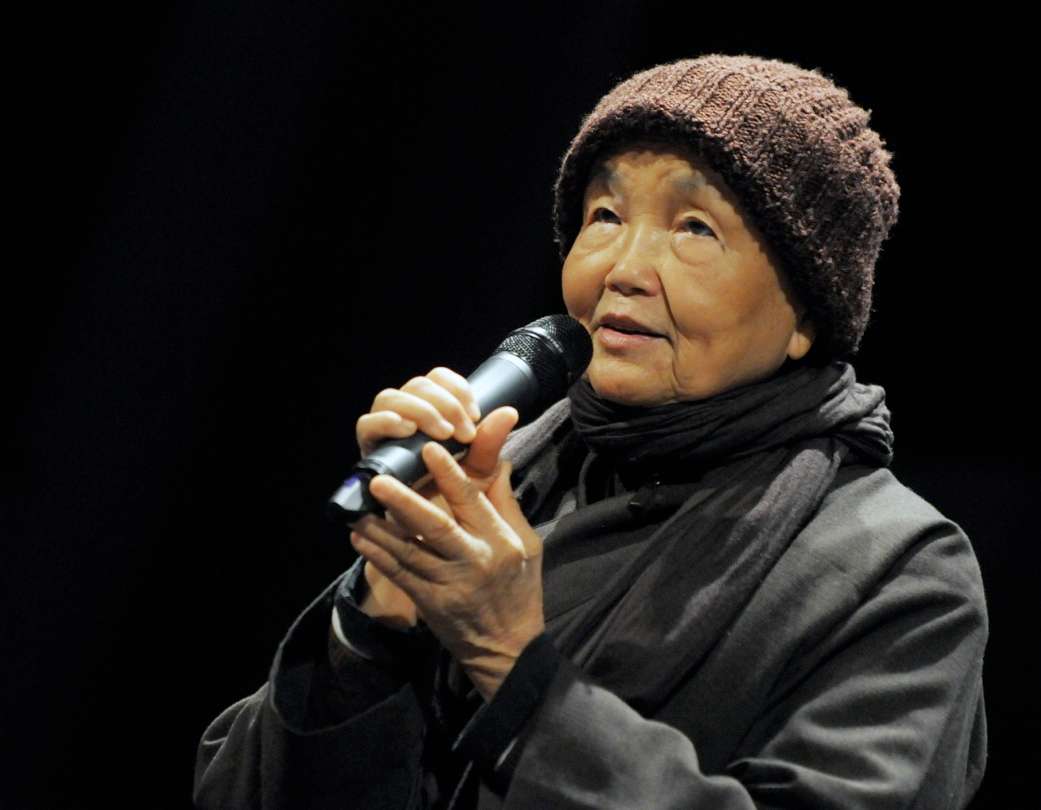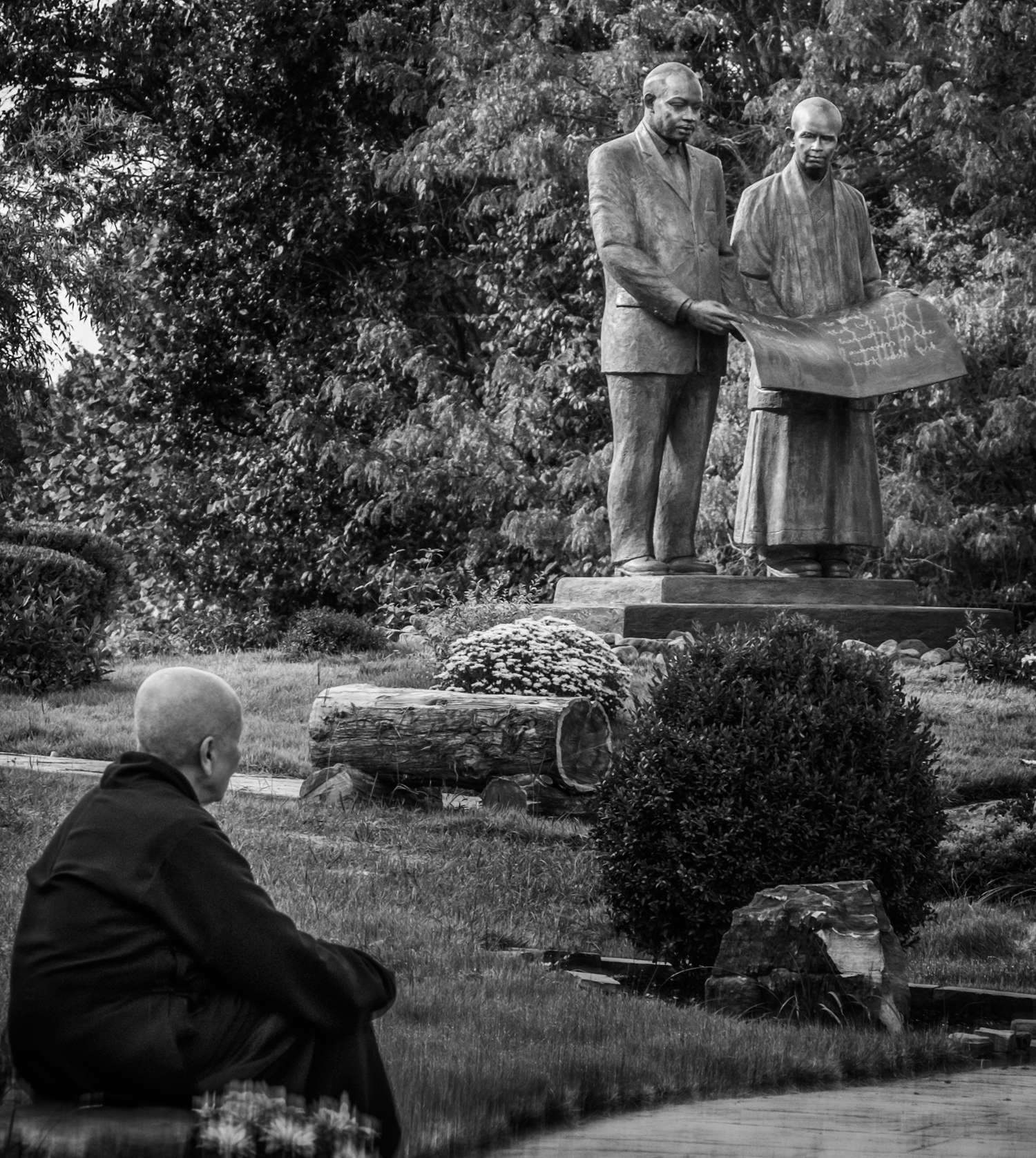Singing for Thay to Breathe
Sister Chân Không
Sister Chan Khong’s sharing from the second week of Thay’s memorial ceremonies at Tu Hieu Temple.
Thay is the tiger master, I am the tiger cub
I was born in the Year of the Tiger and as a child I was very stubborn; I never listened to anyone’s advice. I would often say, “I am a tiger, don’t force me.” But when I joined the sangha, I did whatever Thay asked me to do and never argued back! I followed Thay’s advice and did my best, to live and die with the things Thay asked of me.
I am twelve years younger than Thay. I see myself as a tiger cub. My role is to fill in the missing parts, however small, of the tiger master–Thay. If the tiger master is missing claws, I will be those claws. Whatever Thay needs help with, I would do. Whatever Thay is unable to do, I would do my best to realize it for Thay.
Singing for Thay to breathe
One time, a group of French senators invited Thay to give a Dharma talk. I drove Thay there. Of course there were others who went along, but as I am most familiar with what Thay needed, I could be of help in whatever situation. Thay had only just returned from a trip to Switzerland the day before, so he was very tired and could not speak much.
A quarter of the way through the Dharma talk, Thay suddenly said in French, “Sr. Chan Khong will now come up and sing a song for everyone.” I was so surprised because Thay had hardly shared anything yet. I quickly went up to Thay. He quietly said to me, “My dear, you can sing three, four, or even five songs for me. I am so tired that I find it hard to breathe.” So I sang one song after another, and turned around from time to time to see when I should stop. Thay told me to keep singing. After a while, he smiled and looked better. Thay gave a wonderful talk that day.

At times when Thay was very tired and unable to teach, he would invite me to sing so he had more time to breathe. I see that though I could not do much, it was still quite important to have someone to sing for Thay to breathe.
Thay, please let me become a nun
When we first came to France, I asked Thay, “Dear Thay, please allow me to become a nun.” But Thay resolutely refused. The reason was that after the Second World War, many French girls who had close relationships with German soldiers were considered traitors and had their heads shaved. Thay said:
“If you shaved your head, others might misunderstand. Do you know why I let my hair grow long? Because in recent times, there appeared a group in Europe called the ’skinheads’. They completely shave their heads and have done some bad things. If I also shaved my head, others would mistake me for a ’skinhead’. That is why I have grown out my hair.”
Thay also told me to keep my hair long and wear the traditional long Vietnamese dress. Later on, when the Vietnam War ended and our efforts to rescue boat people had also ended, there was nothing more I needed to do as a lay person. I begged Thay once more to let me ordain. That time, Thay said:
“To transmit the precepts, we need the precept transmission masters and noble witnesses. But in France, I am the only one.Back then, we were not yet able to invite the venerable monks and nuns from Vietnam to come and preside over a precept transmission ceremony in France. Wait one more year. Next year, I will organize a pilgrimage to India and you will be ordained on Vulture Peak. I will pay homage to and invite the Buddha to be your precept transmission master. I will just be the witness Dharma teacher and read the precepts for the Buddha. I know you are a very good daughter of the Buddha. Just wait.”
Exactly one year later, I was able to go to India with a group of lay friends, including the singer Ha Thanh. At that time, no one knew that after ascending Vulture Peak, Thay would transmit the precepts to me and the noble witnesses would be the Venerables Mahakashyapa, Shariputra, Mahamoggallana, Upali, Ananda, Rahula, Gotami. On top of the Vulture Peak, I received the Bhikshuni Precepts along with Sr. Chan Duc, and Sr. Chan Vi received the novice precepts.
I remember sharing with Thay one time, “I love and respect the World Honored One very much. I wish to follow his path, but I feel that if I ordained in a nunnery in Vietnam, I would not be happy.” The venerable nun in Ben Tre (Sr. Chan Khong’s hometown), a wonderful and virtuous practitioner, loved me very much. She once said to me, “Sooner or later you will become a Buddha. But first, you must practice well so that in your next life you can be a man. Then practice well as a man and you will attain buddhahood.” Hearing this, I said I would set up my own nunnery so it is not so traditional. If I plan to leave men behind to become a nun, why do I want to come back and be a man? It would be such a chore! Listening to me, Thay only smiled and said nothing. I continued to ask, “In the future if I establish a nunnery that does not follow traditional temples, could Thay still be our teacher?” Thay said, “That is fine.”
From then on, I did everything according to Thay’s guidance and Thay’s ideas. I am happy to play a small part in complementing Thay’s career of spreading the teachings.
Returning to roots like Thay
I thought at one point that Thay would not return to Vietnam. But one day in Thailand, the Brothers Phap An, Phap Niem, and Trung Hai came to meet Thay because he wanted to express something very important to them. When the brothers arrived, Thay put one hand on his chest and using that hand, drew a circle on his chest. He stopped when his hand came to rest at the starting point of the circle. We understood the meaning–whether going East or West, in the end, Thay wished to return to his roots.
Today, I also make the deep vow that I will never forget Thay’s roots. Thay’s roots are also my roots. Like Thay, I will also return to my roots.
